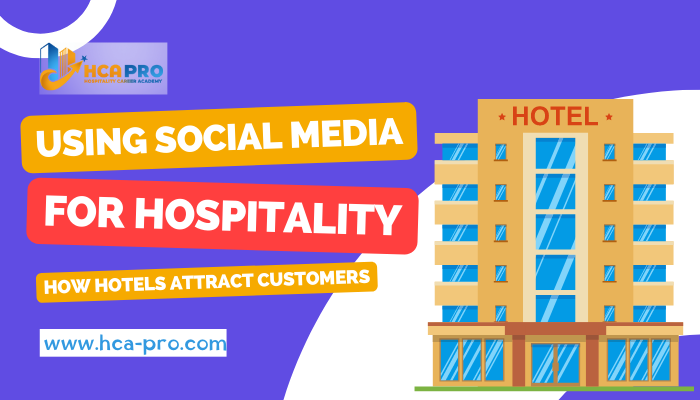
The Power of Social Media Marketing for Hotels: Attracting Customers and Building a Strong Brand
Social media has revolutionized the way businesses promote themselves and interact with their customers. In the hospitality industry, social media marketing has become an essential tool for attracting customers, building brand awareness, and enhancing customer engagement. With over 3.6 billion social media users worldwide, hotels can leverage social media to reach their target audience, showcase their unique offerings, and create a memorable experience for their customers. In this blog post, we'll explore the role of social media in the hospitality industry and provide best practices for hotels to use social media to attract customers and build their brand.
How do hotels use social media to attract customers?
Hotels use social media to attract customers in several ways:
-
Building a Strong Brand: Social media platforms like Instagram and Facebook provide an opportunity for hotels to showcase their brand personality and unique offerings. By posting visually appealing content and engaging with their audience, hotels can build a strong brand and establish themselves as a leader in the industry.
-
Showcasing their Accommodations: Hotels can use social media to showcase their rooms, amenities, and facilities. By posting high-quality photos and videos, hotels can give customers a virtual tour of their property and attract potential guests.
-
Offering Exclusive Promotions: Hotels can use social media to offer exclusive promotions and deals to their followers. By creating a sense of urgency and offering a limited-time discount, hotels can encourage their followers to book a stay.
-
Encouraging User-Generated Content: Hotels can encourage their guests to post photos and reviews on social media, creating a sense of community and promoting their hotel to a wider audience.
How to Use Social Media to Attract Customers to Your Hotel?
As the hospitality industry becomes increasingly competitive, hotels need to use every available tool to attract customers. Social media has become one of the most effective ways for hotels to promote their brand and attract new customers. Here are some of the ways that hotels can use social media to attract customers:
Share High-Quality Photos and Videos of the Hotel's Amenities
One of the most effective ways for hotels to attract customers on social media is by sharing high-quality photos and videos of the hotel's amenities. By showcasing the hotel's rooms, dining options, spa services, and other features, hotels can create a visual experience that appeals to potential guests. Hotels should invest in high-quality photography and videography to ensure that their social media content is visually appealing and professional. They can also use creative captions and hashtags to increase engagement and reach a wider audience.
Highlight Unique Features of the Hotel
To stand out from the competition, hotels should highlight their unique features on social media. This could include architectural features, historical significance, location, or local culture. By showcasing these features, hotels can differentiate themselves and appeal to potential guests who are looking for a unique and memorable experience. For example, a hotel located in a historic building could share photos and stories about the building's history, while a hotel located near a popular tourist attraction could share tips and recommendations for visiting the attraction.
Offer Exclusive Promotions to Social Media Followers
To encourage bookings, hotels can offer exclusive promotions to their social media followers. By offering discounts, special packages, or other incentives, hotels can create a sense of urgency and encourage potential guests to book a stay. Hotels can also use social media to promote last-minute deals or flash sales, which can be an effective way to fill empty rooms and increase revenue.
Create a Sense of Urgency to Encourage Bookings
To create a sense of urgency, hotels can use language and messaging that implies scarcity or time sensitivity. For example, a hotel could say that there are only a limited number of rooms available at a discounted rate, or that the promotion will expire at a certain time. This can encourage potential guests to book a stay before the offer expires or before the rooms are fully booked.
Share Positive Guest Reviews and Testimonials
Sharing positive guest reviews and testimonials on social media can help build trust with potential customers. By showcasing real experiences and opinions from past guests, hotels can show that they value their guests and are committed to providing excellent service. Hotels can also use social media to respond to negative reviews and address customer concerns, which can help improve their reputation and attract new customers.
Respond to Negative Reviews and Address Customer Concerns
In addition to sharing positive reviews, hotels should also be proactive in responding to negative reviews and addressing customer concerns. By acknowledging and addressing customer complaints, hotels can show that they value their guests and are committed to providing excellent service. Hotels should respond to negative reviews in a timely and professional manner, and offer solutions or compensation when appropriate.
Respond to Comments and Messages in a Timely Manner
To provide a personalized experience for potential guests, hotels should respond to comments and messages in a timely manner. This can help build a relationship with potential customers and encourage them to book a stay. Hotels should monitor their social media accounts regularly and respond to comments and messages within 24 hours, if possible.
Provide Personalized Recommendations and Suggestions
When responding to comments and messages on social media, hotels should provide personalized recommendations and suggestions. For example, if a potential guest asks for restaurant recommendations in the area, the hotel could provide a list of recommended restaurants and include information about the hotel's dining options. This can help create a memorable experience for potential guests and show that the hotel values their business.
Collaborate with Influencers to Promote the Hotel's Brand
Collaborating with influencers and bloggers can be an effective way for hotels to reach a wider audience and promote their brand.
Use Social Media Advertising to Target Specific Audiences
Social media advertising can be a powerful tool for hotels to reach specific audiences. By using demographic and interest-based targeting, hotels can ensure that their ads are seen by potential guests who are most likely to be interested in their services. Hotels can also use retargeting to show ads to people who have already visited their website or engaged with their social media accounts.
Engage with Local Communities and Businesses
To build relationships with local communities and businesses, hotels should engage with them on social media. Hotels can share information about local events and attractions, promote local businesses, and participate in community discussions. By becoming a part of the local community, hotels can build brand awareness and establish themselves as a trusted and valuable resource.
Monitor Social Media for Brand Mentions and Reputation Management
Hotels should monitor social media for brand mentions and reputation management. This involves tracking social media accounts and online forums for mentions of the hotel's name, brand, or services. Hotels should respond to both positive and negative mentions in a timely and professional manner, and take steps to address any concerns or issues that are raised.
Use Social Media to Showcase Corporate Social Responsibility Efforts
Hotels can use social media to showcase their corporate social responsibility efforts. This could include promoting sustainable practices, supporting local charities and community initiatives, or highlighting diversity and inclusion efforts. By demonstrating a commitment to social responsibility, hotels can attract socially conscious guests and build a positive reputation.
Measure and Analyze Social Media Metrics to Optimize Performance
To optimize their social media performance, hotels should measure and analyze social media metrics. This includes tracking engagement, reach, follower growth, and website traffic from social media. Hotels should use this data to identify trends and opportunities, and adjust their social media strategy accordingly. By continuously improving their social media performance, hotels can attract more customers and increase revenue.
Social Media for Hotels Case Studies:
Let's take a look at some case studies of hotels that have effectively used social media to attract customers:
-
Four Seasons Hotels and Resorts: Four Seasons uses Instagram to showcase their luxurious properties and unique experiences. With over 1 million followers, Four Seasons has built a strong brand and a loyal following by posting high-quality photos and engaging with their audience.
-
The Standard Hotel: The Standard Hotel in New York City has a unique social media strategy that focuses on user-generated content. The hotel encourages guests to post photos of their stay on Instagram and uses a hashtag to curate and showcase the best photos on their website.
-
Hilton Hotels: Hilton Hotels uses Twitter to offer exclusive promotions and deals to their followers. By creating a sense of urgency and offering a limited-time discount, Hilton Hotels has been able to attract new customers and increase engagement on social media.
The Role of Social Media in the Hospitality Industry
Social media has become an essential tool for the hospitality industry in several ways:
-
Increased Brand Awareness: Social media provides an opportunity for hotels to reach a wider audience and promote their brand. By creating engaging content and targeting the right audience, hotels can increase their brand awareness and attract new customers.
-
Customer Engagement: Social media allows hotels to engage with their customers and build a strong relationship. By responding to comments and messages and offering personalized recommendations, hotels can create a memorable experience for their guests.
-
Reputation Management: Social media allows hotels to monitor their online reputation and respond to negative reviews and comments. By addressing customer complaints and resolving issues, hotels can maintain a positive reputation and attract new customers.
Social Media Marketing in the Hospitality Industry
Social media marketing is a cost-effective way for hotels to promote their brand and attract new customers. Here are some best practices for using social media marketing in the hospitality industry:
-
Create a Strong Brand (Continued): Develop a consistent brand identity across all social media platforms, including a logo, color scheme, and brand voice. This will help create a strong brand image and increase brand recognition.
-
Target the Right Audience: Identify your target audience and create content that resonates with them. Use analytics tools to monitor engagement and adjust your strategy accordingly.
-
Use High-Quality Visuals: Use high-quality photos and videos to showcase your hotel's amenities and create a visual experience for your audience. This will help you stand out and attract potential guests.
-
Engage with Your Audience: Respond to comments and messages in a timely and personalized manner. This will help create a strong relationship with your customers and increase customer loyalty.
-
Offer Exclusive Promotions: Use social media to offer exclusive promotions and deals to your followers. This will create a sense of urgency and encourage your audience to book a stay.
Impact of Social Media in the Hospitality Industry
Social media has had a significant impact on the hospitality industry in several ways:
-
Increased Brand Awareness: Social media has allowed hotels to reach a wider audience and promote their brand at a lower cost than traditional advertising methods.
-
Improved Customer Engagement: Social media has enabled hotels to engage with their customers and build a strong relationship. By responding to comments and messages and offering personalized recommendations, hotels can create a memorable experience for their guests.
-
Enhanced Reputation Management: Social media has made it easier for hotels to monitor their online reputation and respond to negative reviews and comments. By addressing customer complaints and resolving issues, hotels can maintain a positive reputation and attract new customers.
Conclusion:
Social media has become an essential tool for the hospitality industry, providing an opportunity for hotels to reach a wider audience, promote their brand, and engage with their customers. By following best practices for social media marketing, hotels can create a memorable experience for their guests and attract new customers. With the right strategy, social media can help hotels build a strong brand and establish themselves as a leader in the industry.
